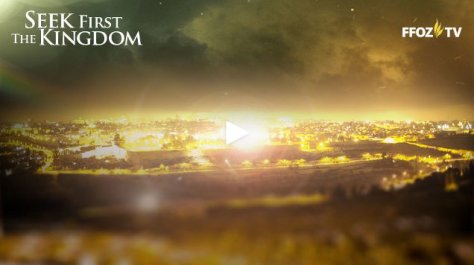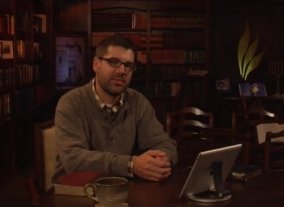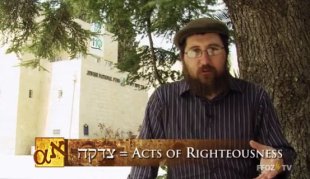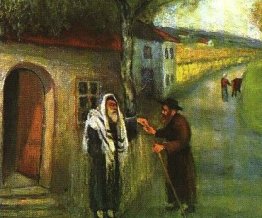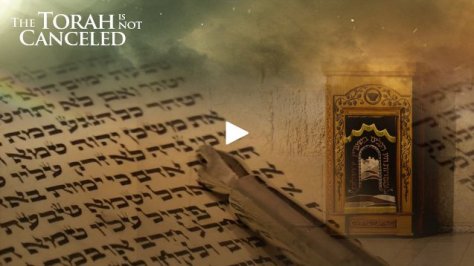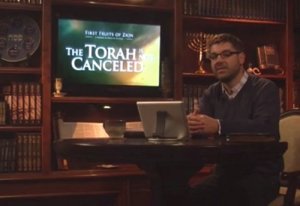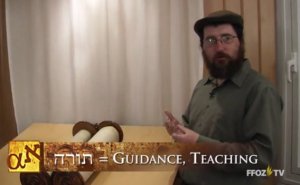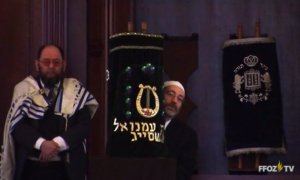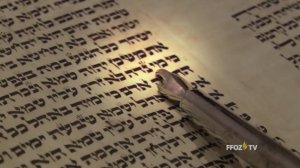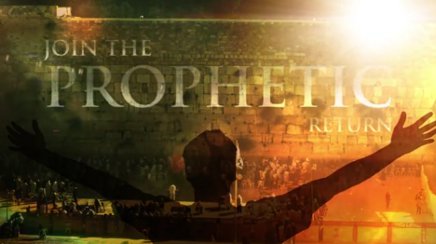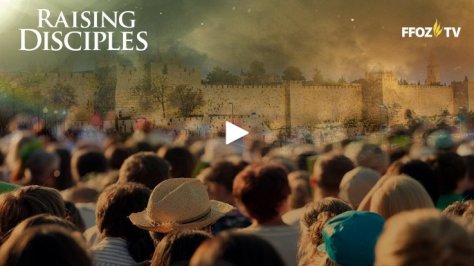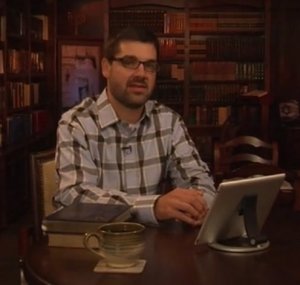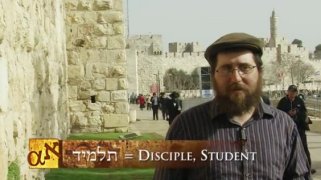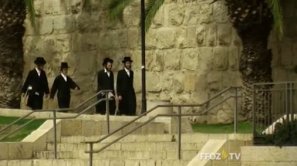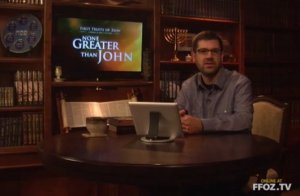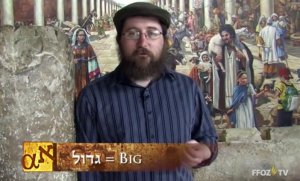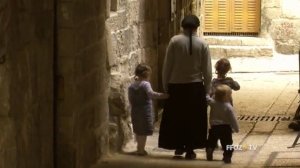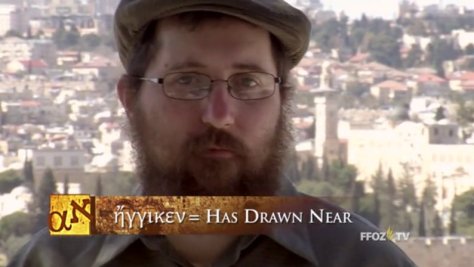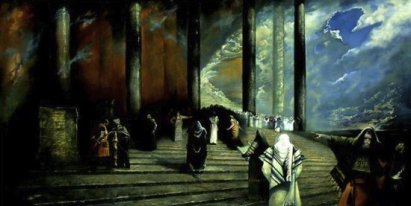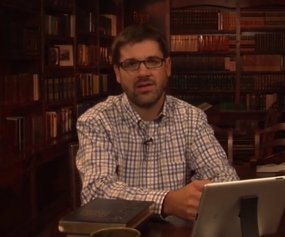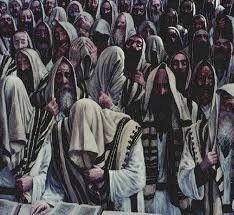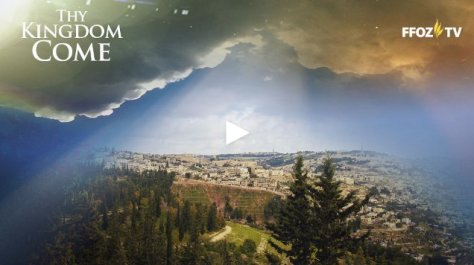 Episode 15: Every day Christians around the world pray the Lord’s Prayer which includes the line “thy kingdom come.” But what are we praying for when asking for his kingdom to come? In episode fifteen viewers will learn that the entire Lord’s Prayer is about the promises of the coming kingdom, the Messianic Era. Prayers for daily bread, forgiveness, and deliverance from evil all find their context in the coming kingdom of God. By teaching his disciples this prayer, Jesus instructs all his followers to take hold of this future today.
Episode 15: Every day Christians around the world pray the Lord’s Prayer which includes the line “thy kingdom come.” But what are we praying for when asking for his kingdom to come? In episode fifteen viewers will learn that the entire Lord’s Prayer is about the promises of the coming kingdom, the Messianic Era. Prayers for daily bread, forgiveness, and deliverance from evil all find their context in the coming kingdom of God. By teaching his disciples this prayer, Jesus instructs all his followers to take hold of this future today.
-from the Introduction to FFOZ TV: The Promise of What is to Come
Episode 15: Thy Kingdom Come
The Lesson: The Mystery of Thy Kingdom Come
First Fruits of Zion teachers Toby Janicki and Aaron Eby have been spending a number of recent episodes focusing on different aspects of “the Kingdom of God” which is defined as the Messianic Age. Today’s episode drills down into what most Christians call “the Lord’s Prayer” and examines the phrase “Thy Kingdom Come.” We all think we know what that means from a Church context, but when Messiah’s disciples asked him how they should pray and he taught them this prayer, what did “Thy Kingdom Come” sound like to first century Israeli Jewish ears? That’s what this lesson proposes to answer.
Toby adds what I considered a little “tongue-in-cheek” (but I’m probably mistaken here) when introducing this subject by saying, “why didn’t Jesus just tell his disciples to pray from their heart?” This could be addressing the distaste most Evangelicals have for liturgical prayer, as if it is dry and spiritless. And yet, it certainly seems like Jesus did teach liturgical prayer to his disciples, and by inference, to us. But more on that in a bit.
Toby refers to the Sermon on the Mount as a description of what it will be like to live in the Messianic Era. Since the Lord’s Prayer is in the portion of scripture that contains the sermon, that must mean, from FFOZ’s point of view, that the Lord’s Prayer also addresses the Kingdom, perhaps more than just by saying “Thy Kingdom Come.”
Therefore, this is what you should pray:
“Our Father, who is in heaven,
may your name be sanctified.
May your Kingdom come;
as your will is done in heaven,
may it also be done on earth.
Give us the bread that is our allotment today,
and pardon us our debts,
as we also have pardoned those indebted to us.
And do not bring us into the hands of testing,
but rescue us from what is evil.–Matthew 6:9-13 (DHE Gospels)
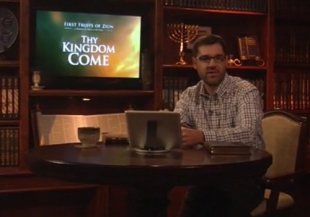 A lot of this episode retraced material about the “Kingdom of Heaven” and the “Kingdom of God” actually being the same thing as the “Messianic Age” and not literally about going to Heaven where God lives or any sort of “afterlife.” The Messianic Era is a span of future time, not a place (although I suppose you could say that it takes place all over the Earth). Toby quotes Isaiah 11:6-7, 10 to tell the audience that it will be a time of absolute peace all over our world. And then he gives us the first clue:
A lot of this episode retraced material about the “Kingdom of Heaven” and the “Kingdom of God” actually being the same thing as the “Messianic Age” and not literally about going to Heaven where God lives or any sort of “afterlife.” The Messianic Era is a span of future time, not a place (although I suppose you could say that it takes place all over the Earth). Toby quotes Isaiah 11:6-7, 10 to tell the audience that it will be a time of absolute peace all over our world. And then he gives us the first clue:
Clue 1: The Kingdom is the Messianic Era.
That’s not much of a clue since this information has been provided to the audience (assuming they’re watching all of these episodes in order) a number of times before. Nevertheless, Toby is building up to something. Part of what he’s saying is that “Thy Kingdom Come” was a Jewish phrase long before it was identified as a Christian phrase. To more completely establish this point and to define the Hebrew word “Malkhut” (Kingdom) for us, the scene shifts to Aaron Eby in Israel.
Aaron introduces the Siddur or Jewish Prayerbook to his Christian audience and says that “Thy Kingdom Come” and similar phrases are very common in Jewish prayers. Many of the prayers in the Siddur quote directly from scripture, but others are quite old and date back to the time of Jesus and earlier.
Before getting to the meat of the matter, Aaron gives his viewers a small lesson on Jewish prayer and the use of the Siddur. He then quotes from such prayers as Kaddish and Aleinu to show parallel passages between the prayers in the Siddur and the different sentences and phrases in the Lord’s Prayer. Aaron attempts to establish the “Jewishness” of the Lord’s Prayer and at least implies the prayers in the Siddur we have today that use similar language to the Lord’s Prayer also date back to the time of Jesus or prior in history.
That actually would have been a good piece of information to nail down more definitely by showing when each of the prayers that contain such language were written (if known). Were the Jews who contributed to those prayers contemporaries of Jesus, did they pre-date him, or did the live many centuries afterward. It would help to know if Jesus was mining liturgical language of the normalized Judaisms of his day or if a much later Judaism could be accused of “borrowing” Jesus words from history (and I encourage you to watch the episode to see the complete explanation Aaron offers).
Returning to Toby in the studio, we are presented with the second clue:
Clue 2: “Thy Kingdom Come” is a common sentiment in Jewish Liturgy.
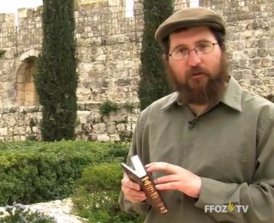 Toby also said that Jesus was “drawing from the well of liturgical prayers of the Judaism of his day,” echoing Aaron’s statements. If true (and I don’t doubt it), then by doing so, Jesus was saying that there was nothing wrong with incorporating normative Jewish liturgy and practices into the worship of God for his Jewish disciples. That begs the question about modern Messianic Jews incorporating today’s practices from the different streams of 21st century Judaism as disciples of Messiah in their worship and if this is acceptable. Another discussion I sometimes have with my Pastor. Jewish liturgy and tradition being used to teach Jewish and Biblical views of God’s Kingdom, Imagine that.
Toby also said that Jesus was “drawing from the well of liturgical prayers of the Judaism of his day,” echoing Aaron’s statements. If true (and I don’t doubt it), then by doing so, Jesus was saying that there was nothing wrong with incorporating normative Jewish liturgy and practices into the worship of God for his Jewish disciples. That begs the question about modern Messianic Jews incorporating today’s practices from the different streams of 21st century Judaism as disciples of Messiah in their worship and if this is acceptable. Another discussion I sometimes have with my Pastor. Jewish liturgy and tradition being used to teach Jewish and Biblical views of God’s Kingdom, Imagine that.
Toby re-reads the Lord’s Prayer, this time from the ESV Bible translation, and asks the question, if a single phrase in the prayer speaks of the Kingdom to Come, what about the rest of the prayer? He tells us that it is his understanding that the Lord’s Prayer speaks of both a believer’s present needs and life, and also addresses the future Messianic Age.
As far as God’s provision goes in “give us this day our daily bread,” Toby quotes from Leviticus 26:5, Ezekiel 34:29, and Joel 2:24-26 to show how each of these prophets foretell of God’s perfect provision in the Messianic Era. Of all that Messiah will accomplish, he will eliminate famine and hunger worldwide, giving each of us our “daily allotment of bread.”
“Forgiveness of debts (sins)” also happens in the Messianic Age according to Jeremiah 31:34 and the following:
I will cleanse them from all their iniquity by which they have sinned against Me, and I will pardon all their iniquities by which they have sinned against Me and by which they have transgressed against Me.
–Jeremiah 33:8 (NASB)
“Lead us not into temptation and deliver us from evil” is also an indicator of the Messianic Era, since we are given a new heart and a new spirit that we might not sin against God or human beings.
Then I will sprinkle clean water on you, and you will be clean; I will cleanse you from all your filthiness and from all your idols. Moreover, I will give you a new heart and put a new spirit within you; and I will remove the heart of stone from your flesh and give you a heart of flesh. I will put My Spirit within you and cause you to walk in My statutes, and you will be careful to observe My ordinances.
–Ezekiel 36:25-27 (NASB)
What Toby doesn’t mention is that this specific scripture also establishes that in the Messianic Age, the Spirit within us (or at least the Jewish audience presupposed by Ezekiel) will cause us (them) to “walk in My statutes, and you will be careful to observe My ordinances.” It’s hard to not to read “Torah” into “statutes” and “ordinances,” and echos another recent FFOZ TV episode.
And our third and final clue is:
Clue 3: The Lord’s Prayer is all about the Messianic Age.
Boaz appears on camera at the end of the episode and introduces next week’s topic: the “Keys of the Kingdom”. It seemed to me that after a standard thirty-minute episode, there should have been something more.
What Did I Learn?
I hadn’t really given much thought about the tie-in between the Lord’s Prayer and the Messianic Age. I suppose, like so many other Christians, I believed I completely understood what Jesus was saying and didn’t feel it necessary to dig any deeper. But again, I’ve been shown that the Bible contains a greater depth and mystery than seems obvious by just a surface reading, especially in English.
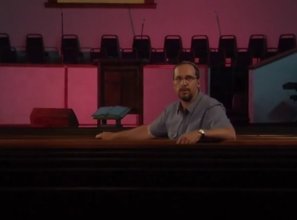 I have to admit to not being as “compelled” by this episode as I have by some of the past shows, maybe because so much of the material seemed like a review rather than fresh information. The main thrust of the message seemed to be a simple “the Lord’s Prayer is Jewish and not Christian, and here’s how we prove it.” It’s another brick inserted in the overall structure Toby and Aaron have been trying to construct for their traditionally Christian viewers in an attempt to make Messianic Judaism more accessible and even palatable.
I have to admit to not being as “compelled” by this episode as I have by some of the past shows, maybe because so much of the material seemed like a review rather than fresh information. The main thrust of the message seemed to be a simple “the Lord’s Prayer is Jewish and not Christian, and here’s how we prove it.” It’s another brick inserted in the overall structure Toby and Aaron have been trying to construct for their traditionally Christian viewers in an attempt to make Messianic Judaism more accessible and even palatable.
I got more out of the further descriptions of the Messianic Era from the Old Testament (Tanakh) scriptures, since this contributes to my investigation of what the Messianic Age looks like when viewed only from the Tanakh. Capturing that view is critical for me in understanding how or if the Tanakh’s portrait of Moshiach matches up to the New Testament’s, particularly the fundamentalist and evangelical Christian interpretations of the apostolic writings. FFOZ is one of the few places I can turn to in order to realize a Jewish perspective on both the Tanakh and the later writings. If they can’t be reconciled, then either our interpretations are flawed or something more dire has happened.
I will review another episode next week.

